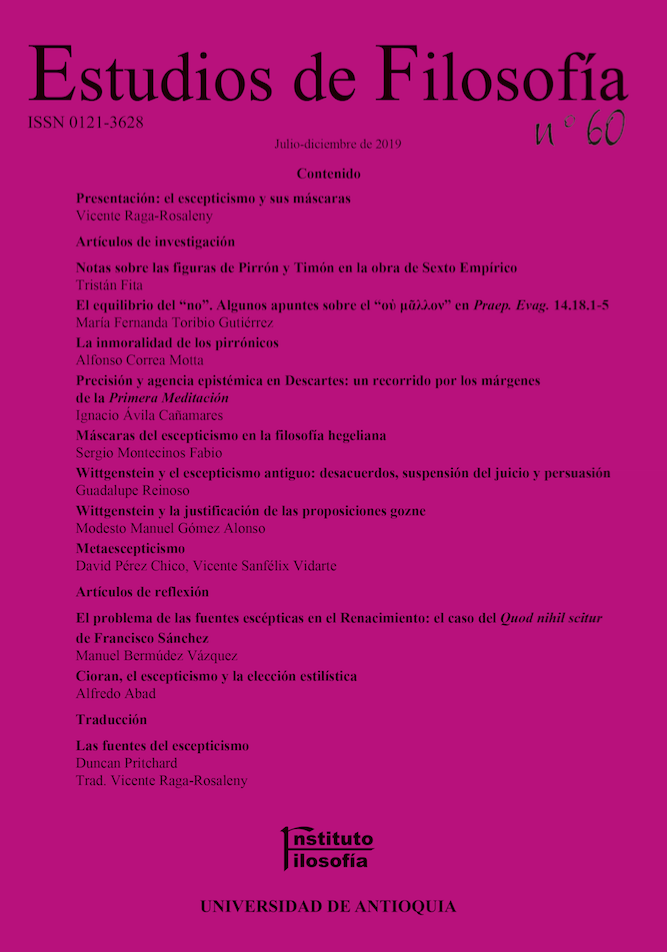The immorality of the Pyrrhonists
DOI:
https://doi.org/10.17533/10.17533/udea.ef.n60a04Keywords:
Pyrrhonism, Aristocles of Messene, immorality objection, apraxia objection, Aristotelian theory of virtueAbstract
In this paper I revisit Aristocles’ formulation of the objection of immorality addressed to the Pyrrhonists (apud Eusebio Praep. Ev. 14.18.18-19), as well as a possible skeptical answer transmitted by the same source (14.18.20). Concerning the objection, I will try to show that it is an ethical and not a practical charge, which should not therefore be confused with the objection of apraxia. Concerning the answer, I will argue that it is necessarily a de ationary solution, which leaves part of the accusation intact, simply because the Pyrrhonist cannot and should not admit the terms in which it has been raised.
Downloads
References
Bett, R. (2000). Pyrrho, his Antecedents, and his Legacy. Oxford: Oxford University Press.
Bett, R. (2015). Pyrrhonism in Diogenes Laertius. En K. M. Vogt (Ed.), Pyrrhonian Skepticism in Diogenes Laertius (pp. 75-104). Tübingen: Mohr Siebeck.
Brunschwig, J. (1994). Once again on Eusebius on Aristocles on Timo on Pyrrho. En J. Brunschwig, Papers on Hellenistic Philosophy (pp. 190-211). Cambridge: Cambridge University Press.
Bywater, I. (1894). Aristotelis Ethica Nicomachea. Oxford: Clarendon Press.
Chiesara, M. L. (2001). Aristocles of Messene. Testimonia and Fragments. Oxford: Oxford University Press.
Correa Motta, A. (2015). De fines y elecciones pirrónicos. Un análisis comparativo de DL 9.107-8 y M 11.141-167. Ideas y valores 64(159), 227-258.
Correa Motta, A. (2016). ¿Es posible vivir el escepticismo? En A. Lozano-Vásquez & G. A. Meléndez (Eds.), Convertir la vida en arte: una introducción histórica a la filosofía como forma de vida (pp. 91-132). Bogotá: UNAL.
Corti, L. (2009). Scepticisme et langage. Paris: Vrin.
Decleva Caizzi, F. (1981). Pirrone. Testimonianze. Roma e Napoli: Bibliopolis.
De Lacy, P. (1958). Οὐ μᾶλλον and the Antecendents of Ancient Scepticism. Phronesis 3, 59-71.
Ferrari, G. A. (1968). Due fonti sullo scetticismo antico. Studi italiani di filologia classica 40, 200-224.
Ferrari, G. A. (1981). L’immagine dell’equilibrio. En G. Giannantoni, Lo scetticismo antico (vol. 1, pp. 337-70). Roma e Napoli: Bibliopolis.
Gottschalk, H. B. (1987). Aristotelian philosophy in the Roman world from the time of Cicero to the end of the second century AD. En W. Haase & H. Temporini (Eds.), Aufstieg und Nierdergang der Römischen Welt (II.36.2, pp. 1019-1174). Berlin & New York: De Gruyter.
Long, A. & Sedley, D. (1987). The Hellenistic philosophers (2 vols.). Cambridge: Cambridge University Press.
Moraux, P. (1984). Der aristotelismus bei den Griechen (vol 2). Berlin & New York: De Gruyter.
Mras, K. (1954). Eusebius: Praeparatio evangelica. Berlin: De Gruyter.
Mutschmann, H. (1914). Sexti Empirici Opera. Vol. II. Adversus dogmaticos libros quinque. Leipzig: Teubner.
Mutschmann, H. & Mau, I. (1958). Sexti Empirici Opera. Vol 1. Πυρρονείων ὑποτυπώσεων. Leipzig: Teubner.
Obdrzalek, S. (2006). Living in Doubt: Carneades’ Pithanon Reconsidered. Oxford Studies in Ancient Philosophy 31, 243-280.
Obdrzalek, S. (2015). From Skepticism to Paralysis: The Apraxia Argument in Cicero’s. Academica. Ancient Philosophy 32, 369-392.
Spanneut, M. (1994). Apatheia ancienne, apatheia chrétienne. Première partie: l’apatheia ancienne. En W. Haase & H. Temporini (Eds.), Aufstieg und Nierdergang der Römischen Welt (II.36.7, pp. 4542-4717). Berlin & New York: De Gruyter.
Stopper, M. R. (1983). Schizzi pirroniani. Phronesis 28, 265-297.
Striker, G. (1996a). Sceptical Strategies. En G. Striker, Essays on Hellenistic Epistemology and Ethics (pp. 92-115). Cambridge: Cambridge University Press.
Striker, G. (1996b). Ataraxia: Happiness as tranquility. En G. Striker, Essays on Hellenistic Epistemology and Ethics (pp. 183-195). Cambridge: Cambridge University Press.
Susemihl, F. (1884). [Aristotelis Ethica Eudemia] Eudemi Rhodii Ethica. Leipzig: Teubner.
Trabucco, F. (1960). La polemica di Aristocle di Messene contro lo scetticismo e Aristippo e i Cirenaici. Rivista Critica di Storia della Filoso a 15, 115-140.
Vogt, K. M. (2010). Scepticism and Action. En R. Bett (Ed.), The Cambridge Companion to Ancient Scepticism (pp. 165-180). Cambridge: Cambridge University Press.
Warren, J. (2002). Epicurus and Democritean Ethics. An Archeology of Ataraxia. Cambridge: Cambridge University Press.
Published
How to Cite
Issue
Section
Categories
License
Copyright (c) 2019 Alfonso Correa Motta

This work is licensed under a Creative Commons Attribution-NonCommercial-ShareAlike 4.0 International License.
Authors who publish with this journal agree to the following terms:
1. The Author retains copyright in the Work, where the term "Work" shall include all digital objects that may result in subsequent electronic publication or distribution.
2. Upon acceptance of the Work, the author shall grant to the Publisher the right of first publication of the Work.
3. The Author shall grant to the Publisher a nonexclusive perpetual right and license to publish, archive, and make accessible the Work in whole or in part in all forms of media now or hereafter known under a Creative Commons Attribution-NoCommercia-ShareAlike (CC BY-NC-SA 4.0), or its equivalent, which, for the avoidance of doubt, allows others to copy, distribute, and transmit the Work under the following conditions: (a) Attribution: Other users must attribute the Work in the manner specified by the author as indicated on the journal Web site;(b) Noncommercial: Other users (including Publisher) may not use this Work for commercial purposes;
4. The Author is able to enter into separate, additional contractual arrangements for the nonexclusive distribution of the journal's published version of the Work (e.g., post it to an institutional repository or publish it in a book), as long as there is provided in the document an acknowledgement of its initial publication in this journal;
5. Authors are permitted, and Estudios de Filosofía promotes, to post online the preprint manuscript of the Work in institutional repositories or on their Websites prior to and during the submission process, as it can lead to productive exchanges, as well as earlier and greater citation of published work (see The Effect of Open Access). Any such posting made before acceptance and publication of the Work is expected be updated upon publication to include a reference to the Estudios de Filosofía's assigned URL to the Article and its final published version in Estudios de Filosofía.















